|
Indian restaurants have
been flourishing in the
capitals of the world and thus, Indian cuisine is no longer a
mystery. In UK, Indian curry is the
third most popular dish among the Britons. Among the Japanese,
the curry rice is relished quite a lot and it is the second most popular
dish according to a recent survey. UK has more than 1000 Indian
restaurants and USA, Canada and
Japan have over 100 restaurants each. India attracts over
2.4 million foreign visitors every year for an average stay of
one month.
SPICY PLEASURES
It is quite interesting to note that most of the Indian spices have a
medicinal value.
The most commonly used spices and herbs in Indian cooking are
asafetida, cardamom, clove, cinnamon, coriander, garlic,
ginger, turmeric and aniseed.
Turmeric, Ginger and Cardamom are the most commonly used herbs as
they have digestive properties. Turmeric gives the dish a pleasant yellow natural colour
and helps to preserve the food. Coriander seeds are supposed to have a cooling effect on the body
of a person. Saffron, the most
expensive spice, creates a nice flavour and fragrance with
just
a little quantity. Mustard, cinnamon, nutmeg,
pepper, cloves, poppy and caraway seeds are some other spices used in Indian
dishes.
In India,
Masala is commonly used which is a blend of various spices and
it is either in a dry or a liquid paste. Garam-Masala is a blend of fragrant spices
which include cinnamon, cloves, cumin seeds, mace, coriander seeds,
nutmeg, and black pepper.. It can
stored and kept for future use. Nowadays, Garam-Masalas are
conveniently available in packets in any grocery. |
|
|
|
|
|
|
Indian cuisine
has a lot of
variety to offer. Indian food can broadly be divided into four
different regions corresponding to Delhi for the North,
Bombay for the West, Madras for the South and Calcutta for
the East. Many varieties of curry- dishes
are made in different parts of India, each of which has its own distinct flavour.
For the Indians, curry encompasses a whole class of dishes.
There are numerous curries which are prepared with meat,
fish, chicken, vegetables and on occasions, fruits. The only
common factor in all the curries is that they all contain
freshly ground spices, including turmeric, and have a
‘gravy’. The Cooking medium is is pure ghee (clarified
butter). Other vegetable fats are now more commonly used as the
cooking medium.
Besides the
preparation, its presentation of food is also important to Indians. Traditionally, India
food is served either on a well washed large banana leaf or
in a thali which is a large plate made of brass, steel or silver.
On the thali, several katoris (little bowls) are placed to hold
small helpings of each dish. A typical meal may consist of a
meat or fish dish, two vegetable dishes, dal, yoghurt and a
sweet dish of kheer or halwa. Other accompaniments include
pickles, chutneys, papads, etc. Porcelain plates are
also used commonly by Indian people.
|
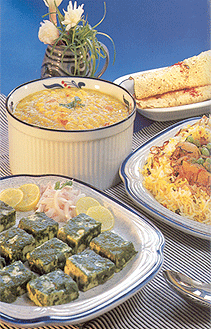
|
|
|
|
|
|
Regional
choices North Indian Food |
|
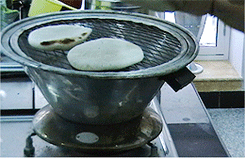 |
Bread is more
commonly eaten than rice. The omnipresent chappati is
the common man’s dish. Nan is kind of a luxury and is
preferred eaten with tandoori food. Another variety of
rich bread
is parantha which is prepared of wheat flour and is
relished by almost everyone. Since most Indian
restaurants abroad serve Tandoori food, the foreigners
are more familiar with it. Tandoori
chicken or mutton is a barbecued food which is spiced
and marinated in yoghurt. Tandoori chicken with a
nan, green salad and a dessert is a dish which the
tourists cannot resist.
|
|
|
Tandoori
food is not very spicy and is much similar to western
cooking. In Delhi, many varieties of
meat kababs are made like the Boti Kabab, Reshmi Kabab,
Pasinda Kabab. The
other delicacies of the Northern Indian
cuisine are biryani which is a dish made
of rice, saffron and marinated lamb or chicken. Pulao is a slightly less
complicated version of biryani. There
is another exciting version – sweet
pulao made with rice, coconut, almonds,
mangoes and papayas.
|
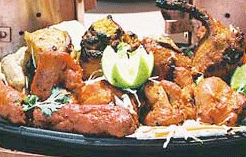 |
|
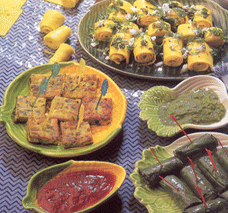 |
Besides tandoori food, the other choices
available are Rogan
Josh, lamb curry, Kofta, Korma or Do-Piaza.
Do Piaza is made with lots of onions,
Korma is particularly rich and Koftas are
curry along with small balls of meat. The
large Koftas have a stuffing of boiled eggs. North Indian meal
is also accompanied with a helping of dal
(lentil soup). For the vegetarian lovers,
this cuisine offers several dishes like Panner, Sag
Paneer (cheese with spinach), Bharta, a
delicious vegetable made from egg plant and
several other dishes
combining cauliflower, potatoes and similar
vegetables. The dessert mainly includes kheer, firni
(pudding) or halwa. Since Kashmiri food has also been
influenced by Mughlai food it has many
varieties of meat dishes especially lamb dishes,
and is spicier compared to other typical
North Indian dishes.
|
|
|
|
|
|
UP
|
|
|
|
In
Bengal, food is quite plain and rice is the staple diet. Most, Bengalis
prefer fresh water fish and fortunately there is an abundance of it in many
homes in rural Bengal which have their own fish ponds. Mustard seeds and
mustard oil are generally used as the cooking medium for the various
fish dishes. Bekdi, a special fish of Bengal, specially lends itself to
Western style of cooking. If Bengali’s first love is fish, then the second
is sweets. Special and typical sweet that come from Bengal are Misti Doi
which is the sweetened yoghurt, Sandesh and Rasgullas, made in different
ways from cottage cheese. Bengali cuisine is unique in India where
plain yoghurt is missing in its menu. Traditionally, no sweets are made at
home and are always bought at a confectioner’s.
|
|
|
|
|
|
|
|
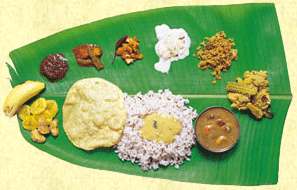
|
South Indians
eat a lot of rice and their curry is as rich as in North
India, but it is spicier. Their vegetarian food provides a
lot of variety, especially the Brahmin cuisine which is
different from the non-Brahmin food. Tamarind chillies and
coconut have an abundant growth in the states of south.
Sambhar, the staple dish of South Indians, is made with a
combination of arhar, yellow lentil, tamarind, spices and
vegetables. A typical meal in the South consists of
sambhar, rasam (a thin lentil soup), some vegetable
preparations which are often cooked with grated coconut
and yoghurt and eaten with boiled rice. However, the
most popular dishes are dosas and idlis whose popularity
spreads throughout the country. Dosas are fried pancakes,
whereas idlis are more like teamed dumplings. They
are made with a mixture of ground fermented rice and dal
and are served with sambhar and coconut chutney.
|
|
|
|
UP |
|
|
|
The food
available in Mumbai varies from the food in the rest of the country.
This is perhaps due to the presence of small but
influential communities of Parsis, Sindhis,
Punjabis, Goans and Khoja Muslims. A few
years ago, Goa was occupied by the Portuguese and hence the Portuguese influence is
evident in its cuisine. One of Goa’s best known dishes is
Vindaloo, chicken pork or fish cooked with spices and
vinegar. Unlike other Indians, Goans eat a lot of pork. The fresh
sausages and seafood have a special taste. Two other
Muslim communities the Boras and the Khojas have their own
style of cooking. The Sindhis, prepare a different cuisine
which is more often meat-based. The majority of Maharashtrians and the Gujaratis,
the original natives of this region, are vegetarians. They have
mastered the art of vegetarian cooking and their
cuisine involves minimum spices and light cooking for
retaining the nutritional value of the meals.
|
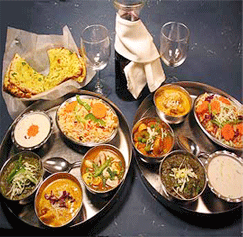
|
|
|
|
|
|
|
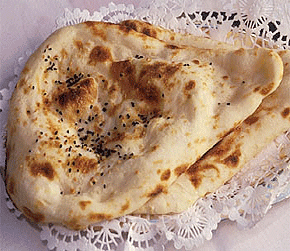
|
India
offers a vast variety of breads. Unlike in the West, these
breads are the mainstay of India meals. Chappatis and nans are
cooked in an oven or tandoor. Thin and small chappatis are made on an iron griddle placed on gas or fire. The commonest
bread is the chappati.
Basically, the chappati is just flour and water dough rolled
very thin and cooked like a pancake on slow heat. These are hot
and fresh.
Some breads like puris are fried in deep fat and paranthas are
pan fried with a little fat, preferably ghee. These are quite soft and delicious. Indians
also make parathas stuffed with potatoes or other vegetables
which are complete meals and are eaten along with plain
yoghurt and pickle. Puris are made
from the same basic dough rolled out thin and round with a wooden
roller and deep-friend in clarified butter or vegetable fat.
Similarly, a hot bread made of slightly different dough is
called a loochi in Calcutta and it tastes very different from
puris.
|
|
|
|
|
|
|
|
India is a country
of sweets and each region of India has its own specialties. Most
Indian sweets are made by boiling down milk to remove the
moisture. It is called khoa. When butter, sugar and many other
flavours are added, then these take the form of barfi, malai,
kheer, rasgulla, gulabjamun and sandesh. The various regional
recipes have different forms of rice puddings, milk puddings,
vegetable and fruits dipped in sweet syrup etc. Combinations of
all these offer hundreds of varieties of sweet dishes. These
desserts can be decorated with raisins, almonds, and pistachio
etc.
|
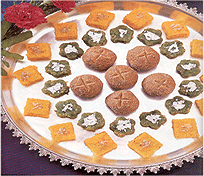
|
|
|
|
|
|
|
|
Paan is generally eaten by people after having their food. Paan is a betel leaf wrapped
around a variety of ingredients. Every paan-seller has his
special recipe to make. There are as numerous styles of
preparing paan in India. The paan made of betel leaf is the most
popular and it is considered to be digestive.
|
|
|
|
|
|
UP |
|
|

